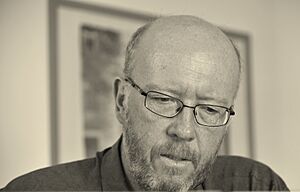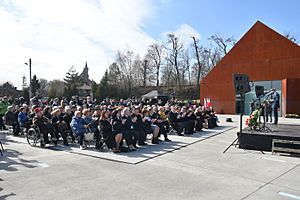Jan Grabowski facts for kids
Quick facts for kids
Jan Grabowski
|
|
|---|---|

Grabowski in 2018
|
|
| Born | June 24, 1962 (61 years old) Warsaw, Poland
|
| Nationality | Polish-Canadian |
| Education | Université de Montréal (PhD, 1994) |
| Occupation | Historian |
| Era |
|
|
Notable work
|
Hunt for the Jews: Betrayal and Murder in German-Occupied Poland (2013) |
| Awards | Yad Vashem International Book Prize for Holocaust Research |
| Scientific career | |
| Institutions | University of Ottawa |
| Thesis | 'The Common Ground. Settled Natives and French in Montréal 1667–1760' (1993) |
Jan Zbigniew Grabowski (born June 24, 1962) is a Polish-Canadian history professor. He teaches at the University of Ottawa. His main area of study is the relationship between Jewish and Polish people during World War II. This includes the time when Germany occupied Poland and the terrible events of the Holocaust in Poland.
In 2003, Grabowski helped start the Polish Center for Holocaust Research in Warsaw, Poland. He is well-known for his book Hunt for the Jews: Betrayal and Murder in German-Occupied Poland (2013). This book won the Yad Vashem International Book Prize.
Contents
Early Life and Education
Jan Grabowski was born in Warsaw, Poland. His mother was Catholic, and his father was Jewish. His father, Zbigniew Grabowski, survived the Holocaust. He was a chemistry professor and fought in the 1944 Warsaw Uprising.
While studying at the University of Warsaw, Jan Grabowski was part of the Independent Students' Union. From 1981 to 1985, he helped run a secret printing press. This press supported the Solidarity movement, which worked for freedom in Poland. He earned his master's degree in 1986.
In 1988, he moved to Canada. This was after Poland's communist government made it easier for people to travel. He later earned his Ph.D. from the Université de Montréal in 1994. His Ph.D. paper was about the early history of Montréal.
Academic Career
Grabowski joined the faculty at the University of Ottawa in 1993. From 2016 to 2017, he was a special scholar at the United States Holocaust Memorial Museum. There, he studied the "Blue Police" in Poland during World War II. He received a grant to support this research project.
Research and Books
Jan Grabowski's research focuses on the Holocaust in Poland. He studies how people behaved during this difficult time.
Hunt for the Jews
Grabowski's most famous book is Hunt for the Jews. It was first published in Poland in 2011. A new version came out in 2013 from Indiana University Press. This book won the Yad Vashem International Book Prize in 2014.
The book describes the "Jew hunt" that happened from 1942 onwards. This was when Germans searched for Jews who had escaped from the ghettos. These Jews were trying to hide among non-Jewish people. Grabowski used old Polish court records and other documents for his research.
He explained that the German policy used terror. Poles could be killed for helping Jews. Also, Germans made a "hostage" system. People in communities had to report hidden Jews. If a Jew was found and not reported, the "hostages" would be punished. This made many people motivated to report Jews. Grabowski's research suggests that many Jews in hiding were reported by local people.
The book caused a lot of discussion in Poland.
The Polish Police
In 2017, Grabowski published another book called The Polish Police: Collaboration in the Holocaust. This book was based on a lecture he gave at the United States Holocaust Memorial Museum. It looks at the role of the "Blue Police" during the Holocaust.
Night without End
In 2018, Grabowski and Barbara Engelking worked together on a two-volume study. Its title in English is Night without End: The Fates of Jews in Selected Counties of Occupied Poland. This study looked closely at what happened to Jews in nine areas of German-occupied Poland. It also examined how some Poles cooperated with the German occupiers. Grabowski said the book tells a truthful story.
Many experts praised the book for its careful research. However, some scholars in Poland disagreed with its findings. They said the study used unreliable information and did not fully show how harsh the German occupation was.
Court Case
A group called the Polish League Against Defamation supported a court case against Grabowski and Engelking. This case was brought by the niece of a Polish villager mentioned in their book. In February 2021, a court in Warsaw ruled that Grabowski and Engelking should apologize. However, they did not have to pay money.
Many important organizations, like the POLIN Museum of the History of Polish Jews and Yad Vashem, were worried about this ruling. They said it could harm academic freedom and freedom of speech. They believed it was an attempt to scare scholars from publishing their research. In August 2021, an appeals court overturned the ruling. It supported the idea of academic freedom.
Research on Wikipedia
In 2023, Grabowski and historian Shira Klein published an article. They stated that Wikipedia spread wrong information about the history of Jews in Poland. They believed this was due to a small group of editors. Grabowski said he was shocked by how much the history of the Holocaust was changed.
Another historian, Piotr Konieczny, published a response in 2025. He argued that Grabowski and Klein's main ideas were misleading.
Views and Debates
Summary of Views
In 2016, Grabowski wrote about what he called "the history policy of the Polish state." He said that the government's version of history tried to change what researchers had found. He felt it wanted to create a "feel-good" story.
He also disagreed with plans for a monument to Poles who rescued Jews. He thought the monument should be at Grzybowski Square, which was part of the wartime Warsaw Ghetto. He felt the site should focus on Jewish suffering, not just Polish bravery. He described rescuers as a small group, not the general rule.
Poland's embassy in Ottawa criticized Grabowski in 2016. This was after he wrote an article about a new Polish law. This law would have punished people for saying Poland was involved in the Holocaust. However, it made exceptions for research and art.
In July 2017, Grabowski also criticized the Markowa Ulma-Family Museum of Poles Who Saved Jews in World War II. This museum opened in 2016. He thought the museum should give more information about the Polish neighbors of the Ulma family and others who helped Jews.
In December 2018, Grabowski wrote an opinion piece for Haaretz. He criticized Israeli historian Daniel Blatman for taking a job at the new Warsaw Ghetto Museum. Grabowski felt this was helping Polish authorities change the history of the Holocaust. Blatman responded that while the Center for Holocaust Research provided important insights, it did not fully show the terror Germans caused for Poles.
Responses to Grabowski's Work
Since his book Hunt for the Jews came out, Grabowski has faced a lot of criticism in Poland. This mostly comes from groups with right-wing political views. Some tried to get him fired from his job. He has also received threats, which led to more security at his university.
In June 2017, the Polish League Against Defamation (PLPZ) published a statement. About 130 Polish scholars signed it, protesting Grabowski's research. They said it showed a "false and wrongful image of Poland." In response, the Polish Center for Holocaust Research defended Grabowski. They called the criticism "brutal" and "absurd."
Later in June 2017, about 180 historians from around the world signed an open letter supporting Grabowski. They included famous historians like Christopher Browning and Deborah Lipstadt. They said the campaign against Grabowski was "an attack on academic freedom." They stressed that his research met the highest standards. In November 2018, Grabowski sued the PLPZ for defamation.
In May 2023, a lecture by Grabowski in Warsaw was canceled. A far-right politician, Grzegorz Braun, broke Grabowski's microphone during the event.
Selected Books
- (2001). History of Canada.
- (2004). "I know this Jew!": Blackmailing Jews in Warsaw 1939–1943.
- (2008). Rescue for Money: Paid Helpers in Poland, 1939-1945.
- (2010, with Barbara Engelking). Jews Breaking the Law Should Be Punished by Death! "Criminality" of Jews in Warsaw, 1939-1942.
- (2011, with Barbara Engelking). Outline of the Landscape: Polish Countryside Towards the Annihilation of Jews 1942–1945.
- (2011). Judenjagd: Hunt for the Jews 1942–1945.
- (2013). Hunt for the Jews: Betrayal and Murder in German-Occupied Poland.
- (2016). Hunt for the Jews; Betrayal and Murder in Poland During the German Occupation.
- (2014, with Dariusz Libionka, eds.). Keys and Cash: On Jewish Property in Poland Under German Occupation and in the Early Post-War Years, 1939–1950.
- (2017). "The Polish police: Collaboration in the Holocaust".
- (2018, co-edited with Barbara Engelking). Night without End: The Fates of Jews in Selected Counties of Occupied Poland.
- (2020). On Duty: Participation of Blue and Criminal Police in the Destruction of the Jews.
- (2021). Poles, Nothing Happened! Polemics with the Holocaust in the Background.
See Also
- Anti-Jewish violence in Poland, 1944–1946
- Collaboration in German-occupied Poland
- Fear: Anti-Semitism in Poland after Auschwitz (2006)
- History of the Jews in Poland
- Polish Righteous among the Nations
- Rescue of Jews by Poles during the Holocaust
- Szczuczyn pogrom (June 1941)
- Kielce pogrom (July 4, 1946)
- Wąsosz pogrom (July 5, 1941)
- Jedwabne pogrom (July 10, 1941)
- Żegota


